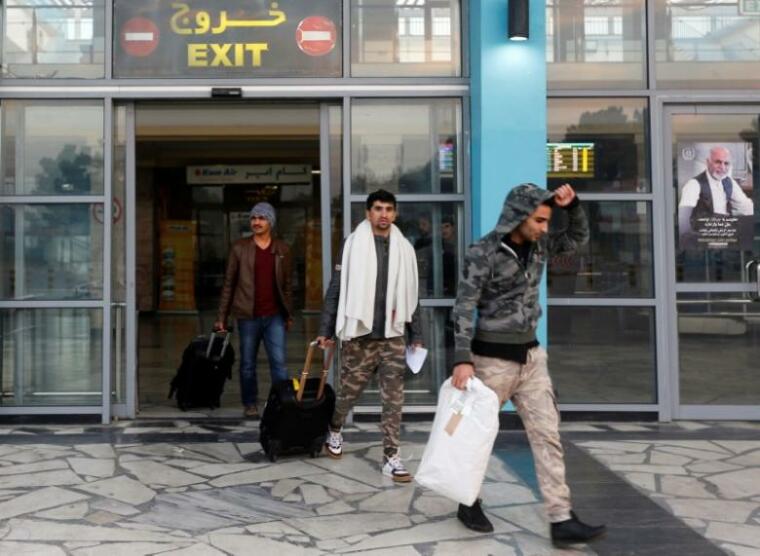Amnesty warns EU about risks of deporting Christian converts back to Afghanistan

Amnesty International has warned European governments about the risks being faced by Afghan Christian converts and other asylum seekers who are being deported back to their country.
The charity has reported that 9,460 asylum seekers were forcibly sent back to their homeland by European states last year, despite the high risk of torture and death they face there.
"In their determination to increase the number of deportations, European governments are implementing a policy that is reckless and unlawful," said Anna Shea, Amnesty's researcher on refugee and migrant rights, as reported by The Independent.
"Wilfully blind to the evidence that violence is at a record high and no part of Afghanistan is safe, they are putting people at risk of torture, kidnapping, death and other horrors," she added.
Among those deported from European countries were unaccompanied children, some of whom were sent to parts of Afghanistan they were unfamiliar with and where did not know anyone, Amnesty noted.
The number of deportations has seen a 300 percent increase compared to the previous year, but the rate of asylum applications accepted by European governments has dropped from 60 percent in September to 33 percent in December last year.
In May 2017, an asylum seeker, referred to as Farid, was deported from Norway back to Afghanistan, despite not having lived in the war-torn country since he was a child.
"I am scared. I don't know anything about Afghanistan. Where will I go? I don't have funds to live alone and I can't live with relatives because they will see that I don't pray," he told Amnesty.
Farid had converted to Christianity while he was living as an asylum seeker in Norway, and he has reportedly shown Amnesty's researchers a video of his baptism. "People in Europe have humanity – they don't care which religion you are," he told the researcher in Kabul in May shortly after his deportation.
Deportees who are members of a religious minority, such as Christianity, are at risk of persecution in Afghanistan, but Farid, who is an ethnic Hazara, is also facing other threats in his province of origin because an enemy of his family previously attacked him. He reportedly showed the researchers "over a dozen deep scars across his legs, arms and torso" that resulted from the injuries he suffered from the attack.
The number of civilians being killed in Afghanistan has reportedly reached an all-time high. According to the United Nations, 11,418 civilians were killed or injured in the country last year, many of them perpetrated by groups including the Taliban and ISIS.
 Christians don't have to affirm transgenderism, but they can’t express that view at work: tribunal
Christians don't have to affirm transgenderism, but they can’t express that view at work: tribunal Archaeology discovery: Medieval Christian prayer beads found on Holy Island
Archaeology discovery: Medieval Christian prayer beads found on Holy Island Presbyterian Church in America votes to leave National Association of Evangelicals
Presbyterian Church in America votes to leave National Association of Evangelicals Over 50 killed in 'vile and satanic' attack at Nigerian church on Pentecost Sunday
Over 50 killed in 'vile and satanic' attack at Nigerian church on Pentecost Sunday Ukrainian Orthodox Church severs ties with Moscow over Patriarch Kirill's support for Putin's war
Ukrainian Orthodox Church severs ties with Moscow over Patriarch Kirill's support for Putin's war Islamic State kills 20 Nigerian Christians as revenge for US airstrike
Islamic State kills 20 Nigerian Christians as revenge for US airstrike Man who served 33 years in prison for murder leads inmates to Christ
Man who served 33 years in prison for murder leads inmates to Christ


 Nigerian student beaten to death, body burned over ‘blasphemous’ WhatsApp message
Nigerian student beaten to death, body burned over ‘blasphemous’ WhatsApp message 'A new low': World reacts after Hong Kong arrests 90-year-old Cardinal Joseph Zen
'A new low': World reacts after Hong Kong arrests 90-year-old Cardinal Joseph Zen Iran sentences Christian man to 10 years in prison for hosting house church worship gathering
Iran sentences Christian man to 10 years in prison for hosting house church worship gathering French Guyana: Pastor shot dead, church set on fire after meeting delegation of Evangelicals
French Guyana: Pastor shot dead, church set on fire after meeting delegation of Evangelicals ‘Talking Jesus’ report finds only 6% of UK adults identify as practicing Christians
‘Talking Jesus’ report finds only 6% of UK adults identify as practicing Christians Mission Eurasia ministry center blown up in Ukraine, hundreds of Bibles destroyed: 'God will provide'
Mission Eurasia ministry center blown up in Ukraine, hundreds of Bibles destroyed: 'God will provide' Church holds service for first time after ISIS desecrated it 8 years ago
Church holds service for first time after ISIS desecrated it 8 years ago Burger King apologizes for 'offensive campaign' using Jesus' words at the Last Supper
Burger King apologizes for 'offensive campaign' using Jesus' words at the Last Supper Uganda: Muslims abduct teacher, burn him inside mosque for praying in Christ’s name
Uganda: Muslims abduct teacher, burn him inside mosque for praying in Christ’s name